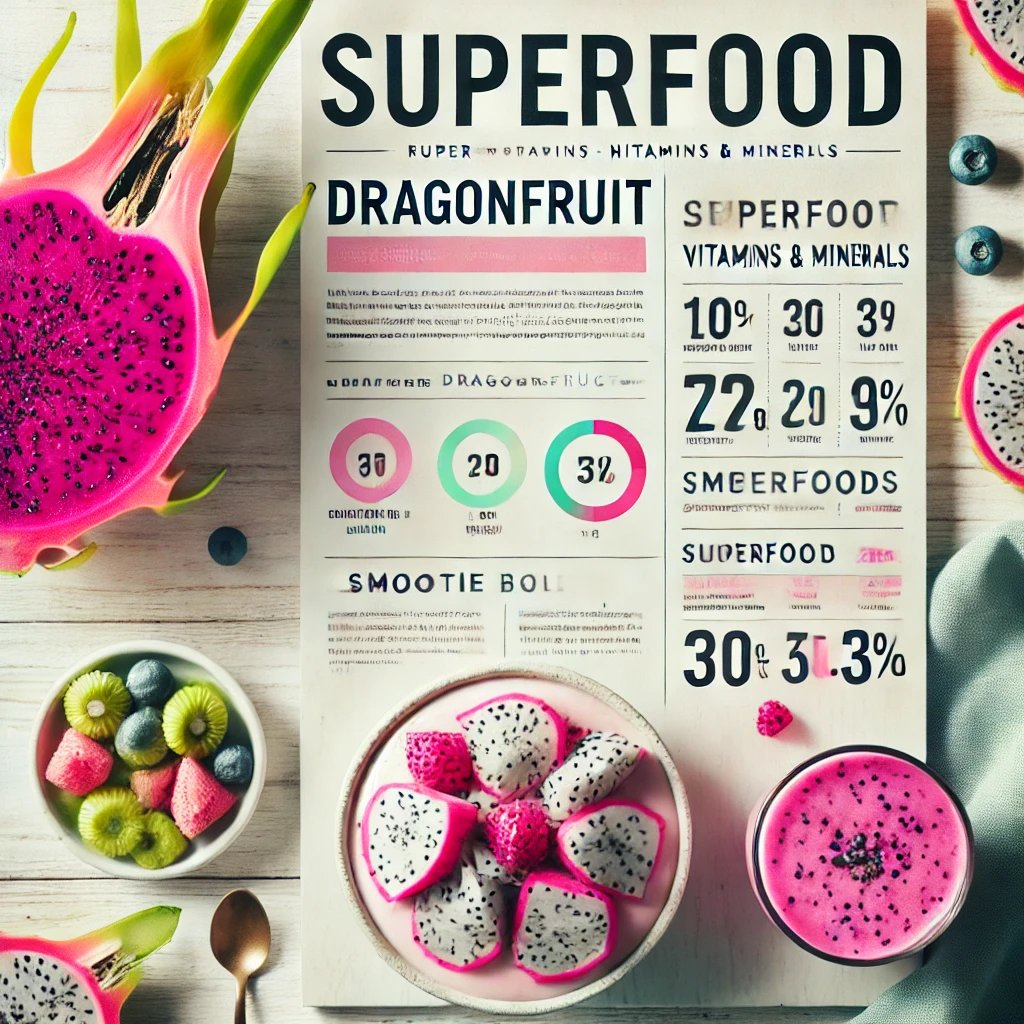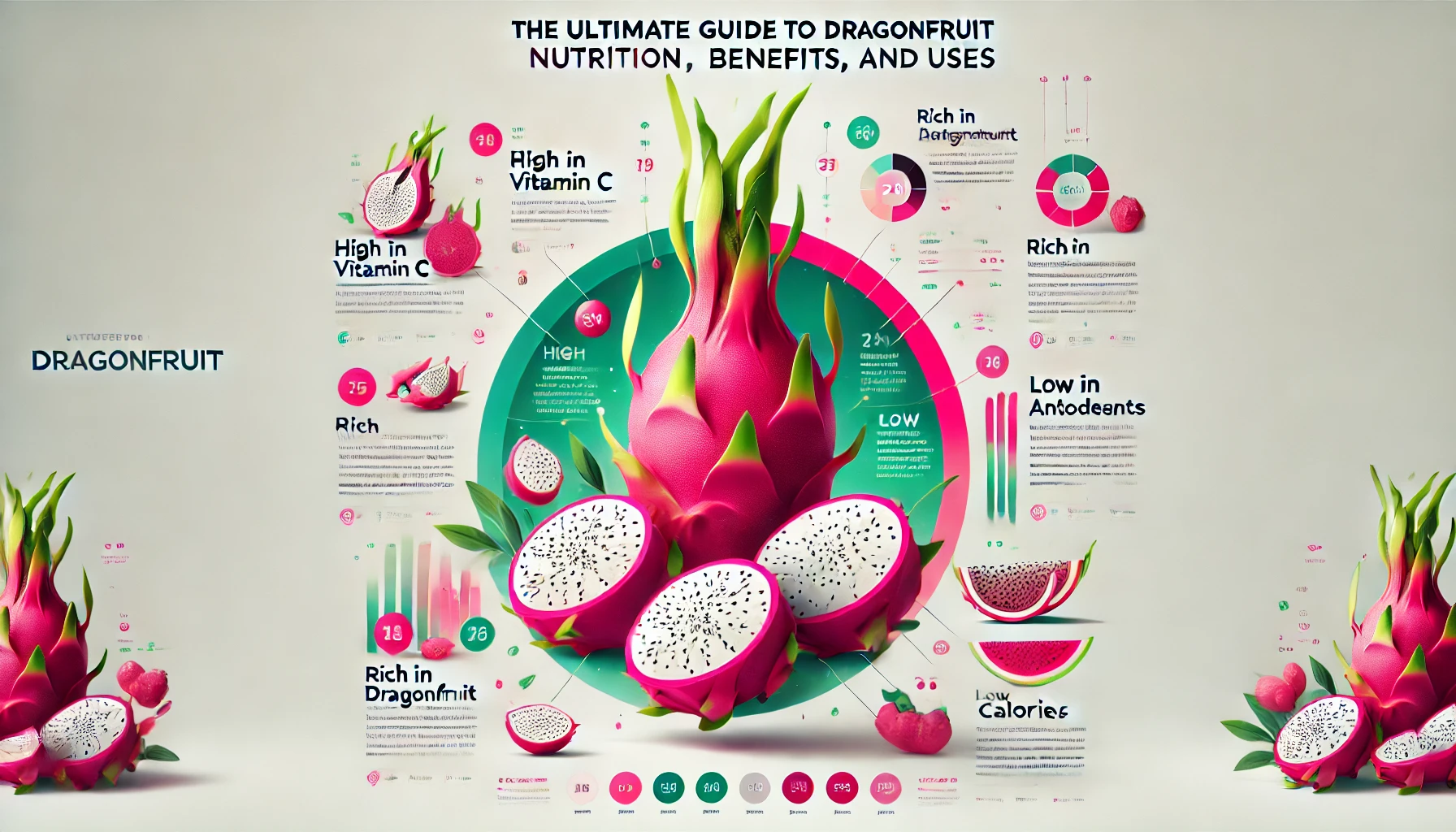Dragonfruit, also known as pitaya or pitahaya, is not only a visually striking fruit but also a nutritional powerhouse. Its vibrant pink or yellow skin and speckled white or red flesh make it a tropical delight, but the true magic lies in its health benefits. Packed with antioxidants, vitamins, and minerals, dragonfruit has gained recognition as a superfood with the potential to support overall health and combat various diseases. Let’s dive into the incredible health benefits of dragonfruit, supported by research and scientific studies.
Nutritional Profile of Dragonfruit
Dragonfruit is low in calories but rich in essential nutrients. A 100-gram serving of dragonfruit contains approximately:
- Calories: 60
- Protein: 1.2 grams
- Fat: 0 grams
- Fiber: 3 grams
- Vitamin C: 34% of the Recommended Daily Intake (RDI)
- Iron: 10% of the RDI
- Magnesium: 18% of the RDI
It also contains small amounts of calcium, potassium, and several B vitamins, making it a well-rounded addition to a healthy diet.
Rich in Antioxidants to Fight Free Radicals
One of the standout features of dragonfruit is its high antioxidant content. Antioxidants are compounds that neutralize free radicals in the body, reducing oxidative stress and preventing cellular damage. The key antioxidants found in dragonfruit include:
- Betalains: These are found in the red-fleshed varieties of dragonfruit and are known for their anti-inflammatory and antioxidant properties. Betalains may help protect against cancer and cardiovascular disease.
- Hydroxycinnamates: These compounds have been shown to exhibit anti-cancer properties in lab studies, particularly in combating oxidative stress.
- Flavonoids: These are a diverse group of phytonutrients linked to brain health and reduced risk of chronic diseases such as heart disease and diabetes.
Research published in the Asian Pacific Journal of Tropical Medicine highlights that dragonfruit’s antioxidants may play a role in reducing the risk of chronic illnesses, including cancer and heart disease.
Boosts Immune Health
Dragonfruit’s high vitamin C content is crucial for a robust immune system. Vitamin C acts as a powerful antioxidant that enhances white blood cell function, helping the body ward off infections. Regular consumption of dragonfruit can contribute to reduced frequency and severity of illnesses such as the common cold.
Supports Gut Health
The high fiber content in dragonfruit promotes healthy digestion and gut health. Dragonfruit contains both soluble and insoluble fiber, which:
- Regulate Bowel Movements: Prevent constipation and promote regularity.
- Feed Healthy Gut Bacteria: Act as a prebiotic, fostering the growth of beneficial gut bacteria such as Lactobacilli and Bifidobacteria.
A 2018 study published in Nutrients found that prebiotics like those in dragonfruit can enhance gut microbiota composition, leading to improved metabolic health and reduced inflammation.
Helps Manage Blood Sugar Levels
Dragonfruit may be particularly beneficial for individuals with type 2 diabetes. Its fiber content helps stabilize blood sugar levels by slowing the absorption of sugar in the bloodstream. A study published in PLOS ONE in 2016 indicated that consuming dragonfruit improved blood sugar levels and reduced insulin resistance in prediabetic individuals. While more research is needed, these findings highlight dragonfruit’s potential as a functional food for diabetes management.
Promotes Heart Health
Dragonfruit is known to support cardiovascular health in several ways:
- Reduces Bad Cholesterol (LDL): The fruit’s betalains and fiber help lower LDL cholesterol levels, reducing the risk of plaque buildup in the arteries.
- Increases Good Cholesterol (HDL): The presence of natural fats in dragonfruit seeds boosts HDL levels.
- Improves Blood Pressure: Its potassium and magnesium content help regulate blood pressure and support heart muscle function.
A study in the World Journal of Pharmacy and Pharmaceutical Sciences highlighted that dragonfruit consumption improved lipid profiles, suggesting its benefits for heart health.
Potential Anti-Cancer Properties
The antioxidants and bioactive compounds in dragonfruit, such as betalains and hydroxycinnamates, have shown promise in reducing the risk of cancer. By neutralizing free radicals and preventing oxidative stress, these compounds may inhibit the growth and spread of cancer cells. While human studies are limited, laboratory research has shown encouraging results.
Promotes Healthy Skin
Thanks to its high vitamin C and antioxidant content, dragonfruit can contribute to glowing, healthy skin. Vitamin C stimulates collagen production, which improves skin elasticity and reduces signs of aging. Additionally, the fruit’s hydrating properties help maintain skin moisture levels, making it a natural beauty booster.
How to Enjoy Dragonfruit
Dragonfruit is incredibly versatile and can be enjoyed in numerous ways:
- Eat it fresh as a snack or dessert.
- Add it to smoothies or fruit salads for a tropical twist.
- Use it as a base for smoothie bowls.
- Incorporate it into homemade ice creams or sorbets.
- Blend it into juices for a refreshing beverage.
Conclusion
Dragonfruit is much more than a beautiful tropical fruit. Its wealth of antioxidants, vitamins, and minerals make it a valuable addition to any diet. From boosting immunity and promoting gut health to reducing the risk of chronic diseases, the health benefits of dragonfruit are backed by emerging scientific evidence. Whether you’re looking to enhance your health or simply enjoy a delicious and exotic fruit, dragonfruit is a choice that’s as good for your body as it is for your taste buds.
Start incorporating dragonfruit into your meals today, and experience the benefits of this superfood firsthand!



